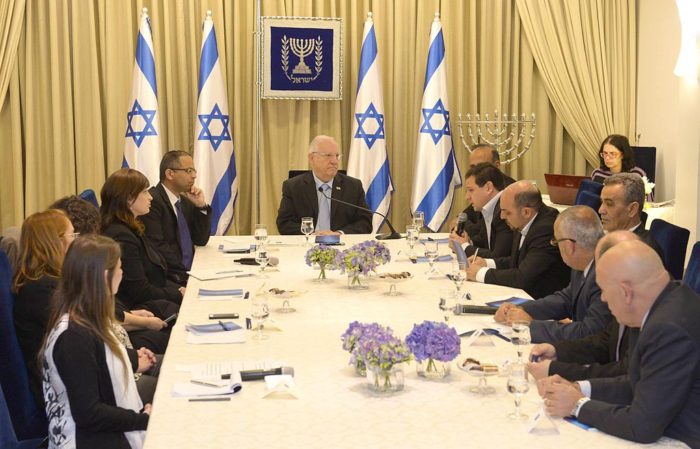Divisions in the coalition could reduce turnout in April and strengthen the right-wing bloc under Netanyahu, reports Jonathan Cook.
By JonathanCook
Jonathan-Cook.net
 A political coalition representing Israel’s Palestinian minority – currently the third biggest faction in the Israeli parliament, the Knesset – has been plunged into crisis by Prime Minister Benjamin Netanyahu’s decision to call for a surprise general election for April.
A political coalition representing Israel’s Palestinian minority – currently the third biggest faction in the Israeli parliament, the Knesset – has been plunged into crisis by Prime Minister Benjamin Netanyahu’s decision to call for a surprise general election for April.
Long-simmering ideological and personal tensions within the Joint List, which includes Israel’s four main Palestinian parties, have erupted into a split over who should dominate the faction.
Knesset member Ahmad Tibi announced this month that he would run on a separate ticket with his small Taal party, after polls showed he was more popular than the List’s current head, Ayman Odeh.
The move is yet another blow to the coalition, which has been beset by acrimony since its establishment four years ago.
The latest divisions threaten to further alienate Palestinian voters in Israel, potentially weakening their representation in the Israeli parliament and strengthening the right-wing bloc under Netanyahu.
The 1.7 million Palestinian citizens of Israel are the remnants of the Palestinian population that was mostly expelled from its homeland in 1948 to create the state of Israel. Today, these Palestinians make up a fifth of the population, but face systemic discrimination.
Voter turnout among Palestinian citizens of Israel has been in steady decline for decades, reaching a low at the 2013 election, when just over half cast a ballot.
No Palestinian party has ever been invited to participate in any of the complex coalitions that are the basis of Israeli governments.
In addition, the Palestinian parties’ use of the Knesset as a platform to call for an end to the Israeli occupation and for equal rights for Palestinian citizens regularly attracts the ire of Jewish Israeli politicians.
Israeli Minister of Public Security Gilad Erdan recently wrote a letter to the Knesset’s ethics committee describing Odeh, the head of the Joint List, as “a criminal and a supporter of terrorism.”
While launching his election campaign this week, former Defense Minister Avigdor Lieberman accused the Joint List of “treason” and called it “total lunacy” to let its representatives participate in the Knesset.
Acrimony in the Joint List
The creation of the Joint List in time for the 2015 legislative elections briefly boosted turnout, as Palestinian voters in Israel hoped it would give a stronger voice to their interests on the national stage.
The List won 13 out of the 120 seats in the Knesset, but a recent poll showed that only 44 percent of Palestinian voters thought it represented their interests, with 52 percent disagreeing.
Tibi’s departure threatens to lead to further splintering of the coalition, with the southern Islamic Movement also reportedly considering breaking away or demanding leadership of the surviving List.
Relations between the two other parties – Hadash, a block of communist and socialist groups headed by Odeh, and national-democratic party Balad – are fractious, as they compete for a similar pool of secular Palestinian voters.
According to Tibi, the fact that his party, Taal, only holds a single seat in the Knesset is “clearly unjust.”
“The composition of the List should be decided by the people, not decreed by the parties,” he said.
According to polls, a separate Tibi ticket would be likely to receive six seats, level-pegging with the remnants of the Joint List.
He said an overhaul of the List would make it more democratic and accountable, and revive flagging support from Palestinian voters in Israel.

Joint List during consultation process at President Reuven Rivlin’s official residence, after 2015 elections. (Mark Neyman, Government Press Office of Israel, CC)
“The competition between two big lists will actually encourage people to come out and vote,” Tibi said. “Surveys show that we can get 12 seats when we run apart, but together we will drop to 10 or 11 seats.
“The other parties don’t want change because they are afraid of the outcome.”
Tibi said he would consider returning to the List only if it introduced more democratic procedures allotting seats to the parties on the basis of their popularity – either assessed through opinion polls or primaries.
Split Could Backfire
On social media, Odeh harshly criticised Tibi for the breakup, accusing him of prioritising his “personal interests”.
“Netanyahu wants to see the Joint List break up more than anyone else. The extreme right wants to divide and conquer the Arabs,” he tweeted.
According to analysts, the split could indeed backfire, fueling disenchantment.
“Surveys show that people support the idea of the Joint List but want more, not less, unity from its parties. They want it better organized and more effective,” said Asad Ghanem, a political scientist at Haifa University.
“If that trend doesn’t continue, a significant proportion are likely to stay home – or vote for Jewish parties on the basis that at least those parties have some influence within the Israeli political system.”
Ghanem also noted that Tibi, a former adviser to late Palestinian national leader Yasser Arafat, had until now been a largely one-man outfit. In the past, he has always allied with another party at election time.
“On paper, Tibi enjoys a lot of support, but that ignores the difficulty he faces widening his party’s appeal,” he said. “He needs to create a convincing list of candidates and establish a party machine capable of bringing out his voters to the polls.”
A combination of low turnout and separate parties could mean one or more fail to pass an electoral threshold, dramatically reducing Palestinian representation in the Knesset.
That would likely delight the Israeli right, including Netanyahu, who raised the electoral threshold before the 2015 vote in an undisguised bid to prevent Palestinian parties from winning seats.
When the Palestinian parties responded by forming the Joint List, Netanyahu used scaremongering on polling day to rally his supporters. He warned Jewish voters that the Palestinian minority was “coming out to vote in droves.”
Aida Touma-Suleiman, a legislator for the Hadash party, said those who preferred the Joint List to splinter were “gambling” that they would manage to pass the threshold. “That’s a very dangerous position to adopt.”
Need for Common Platform
Ghanem criticized the Joint List for failing to make an impact on the most pressing socio-economic issues faced by the Palestinian minority. Half of Palestinian families in Israel live under the poverty line, nearly four times the rate among Israeli Jews.
He also accused the List of failing to effectively counter recent legislative moves by the Netanyahu government that have targeted the rights of Israel’s Palestinian minority.
In 2016, the government passed an Expulsion Law empowering a three-quarters majority of the parliament to ban a legislator for holding unpopular political views. It was widely seen as a measure to silence Palestinian Knesset members.
And last summer, Israel voted through the Nation-State Basic Law, which explicitly gives the Jewish people alone a right to self-determination in Israel.
Ghanem said the Joint List’s failure to offer a clear position on the last law, or mobilise Palestinian opinion against it, was especially glaring.
“The problem is that the List has failed to develop a common political programme. It is not enough to have a Joint List, it must have a joint voice too.”
Touma-Suleiman, however, called much of the criticism of the Joint List unfair.
“The Nation State Law showed exactly what the Netanyahu government thinks of our rights. Anything we achieve is like pulling teeth from the lion’s mouth,” she said. “We are operating in a very hostile political environment.”
Crisis of Legitimacy
Jafar Farah, the director of Mossawa, an advocacy group for Israel’s Palestinian citizens and rumoured to be a future candidate for the Hadash party, agreed with Tibi that the Joint List was suffering from a crisis of legitimacy.
“Who speaks for our community when we address the Israeli public or speak to the Palestinian Authority or attend discussions in Europe?” he asked. “That person needs to be able to say credibly that they represent the community.”
Farah, however, noted that the reality of Palestinians in Israel was “more complicated” than that for most other national minorities. Israeli officials have strenuously objected to any efforts by the Palestinian minority to create its own internal parliament or seek self-determination.
Nonetheless, he said, the Palestinian parties were making themselves irrelevant by focusing on a two-state solution in an era when Netanyahu and the right had imposed on the region their agenda of permanent occupation in the context of a single state.
“We can’t just accept the rules of a political game in which we operate in the margins of a Jewish democracy. It is not enough just to have a leader, we need to offer a new political vision. We have to be creative and bring a new agenda.
“The Jewish majority won’t come to our aid. We have to lead the struggle and be ready to pay the price.”
Ghanem said the Joint List’s failures, combined with the collapse of any peace-making efforts to end the occupation, had encouraged a move away from ideological politics among many Palestinian voters in Israel.
“People are instead increasingly focusing on their own personal concerns,” he said.
He pointed to recent local elections in Nazareth, the largest Palestinian-majority city in Israel, where the main political parties bowed out and left the mayoral race to two independent candidates.
The trend away from ideological politics was being reinforced, as elsewhere, by new media that offered people a wider set of perspectives.
“Generally, people feel more confused, and want clear, strong figures like a Netanyahu or a Trump,” Ghanem said. “Tibi can exploit that trend.”
Tibi said it was vital for the parties to find a way to make alliances with centre and centre-left Jewish parties in the current climate.
“It is not just about getting more Arab legislators into the Knesset,” he said. “It is about having more legislators who can have an influence, who can help shape the choice of the prime minister. That is imperative if we are going to bring down Netanyahu and the right.”
Tibi said he hoped that, by rebuilding the credibility of the Palestinian parties, they would be in a position to form a “blocking majority” in the Knesset, similar to the situation in the early 1990s.
Then, a newly elected center-left coalition headed by Yitzhak Rabin needed the support of the Palestinian parties to push through the Oslo Accords, against fierce opposition from the right, led by Netanyahu.
Rabin did so through an arrangement with Palestinian legislators that they would back the coalition from outside the government.
“We helped Rabin achieve his goals and in return the situation of our community improved, with more rights and higher budgets,” said Tibi. “We can be in that position again but only if we can regain the confidence of our community.”
Calls for Boycott
Tibi and others believe that, if the turnout among Palestinian citizens returns to the levels of the 1980s, the minority could elect several more legislators, potentially tipping the balance towards a center-left government.
But for that happen, the Palestinian parties will need to overturn growing apathy and frustration from their voters, warned Ghanem.
Salman Masalha, a Palestinian columnist for Haaretz newspaper, called the Palestinian members of the Knesset “a fig leaf” whose participation served only to “beautify the state to the world, making it look like a vibrant democracy.”
He argued for a boycott of the election, playing on Netanyahu’s 2015 election incitement: “Arab citizens must respond, ‘the Arabs are boycotting in droves’ the scam of Israeli democracy.”
A boycott of the national elections is the official platform of two factions: the small, staunchly secular Abnaa al-Balad (Sons of the Land) party and the popular northern wing of the Islamic Movement, under Sheikh Raed Salah, which the Netanyahu government outlawed four years ago.
Ghanem observed that Netanyahu’s fate, as he faces indictment on several corruption charges in the midst of the election campaign, could play a decisive role in the turnout of Palestinian voters.
“If Netanyahu looks vulnerable, more [Palestinian voters] will come out in the hope that their parties will be able to support the centre-left in challenging the right.
“But if he looks likely to win, as seems the case at the moment, then many will conclude that the situation is hopeless and stay home.”
Jonathan Cook is a freelance journalist based in Nazareth. He blogs at https://www.jonathan-cook.net/blog/.



John Cook mentions in this article the fact that the Joint List, the coalition between Communist, left-wing, Arab, and Palestinian parties has broken up in recent weeks and will probably have fewer seats in the Knesset. Labor’s failing too and might even fall below the threshold (headed by a fundie leader). But I think this is a good development, for a parliament packed with only extreme Apartheid policies will cement the destruction of the Liberal Zionist facade and polarise world opinion in favour of the Palestinians.
Listen to Palestinians. They came together weekly at the border of barbarism and implored respect for human spirit evolving at an accelerating rate in companionship with Cosmos.
Now materialist capitalism seeks to direct Cosmos expanding at an accelerating rate.
Is that some kind of flamboyant joke?
Cosmic powered biology began when the first quarks precipitated out, even though momentarily, from the primordial plasma of big bang. Sexual attraction. The greater the distance the stronger the force demanding union and creation of a a new individual being never before seen in reality. Sex made us all be alive today. We are totally innocent.
What about a psychiatrist ?